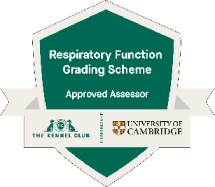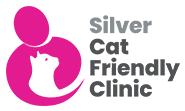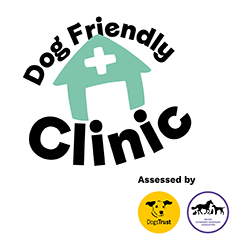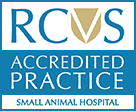No dietary recommendation can be made for dogs and cats with cancer. Each animal, and each cancer, is different, so a ‘one size fits all’ policy rarely works. However, some general guidelines may be helpful. It is also important to note that many ‘myths’ about cancer nutrition are not based on any clinical evidence.
Food is an integral part of the quality of life for dogs and cats. We all gain satisfaction from watching our pets enjoy their food; equally, it can be distressing when our pet does not want to eat. Therefore, the best diet for cancer is always one that a dog or cat likes to eat.
If you have any further questions after reading this leaflet, please do not hesitate to speak to a member of our Oncology Team at Wear Referrals..
Changing diet
We would strongly discourage changing a pet’s diet at the start of treatment for several reasons. Firstly, if the pet develops stomach upsets, it becomes challenging to know whether this is due to the cancer treatment or the change in diet. Secondly, some cancer treatments can affect appetite (e.g. chemotherapy), and it is useful to feed something that we know they will eat. Finally, many dogs and cats do not like changes in their routine. Starting cancer treatment can significantly change some pets’ lives; therefore, keeping a consistent diet will help maintain normality for them.
If you need to change your pet’s diet, please do so slowly by gradually introducing the new food to the existing diet over several days. This helps to avoid stomach upsets as it allows the gut to adapt to the new food.
What about carbohydrate?
Many believe restricting carbohydrates in the diet will ‘starve’ the cancer. This theory is based on studies in cancer cell biology which show that some cancer cells prefer to use glucose (sugar) as a source of energy. However, cancer cell metabolism is complex, and restricting carbohydrate means cancer cells will find another energy source.
Several studies have shown no difference in the metabolism of dogs with lymphoma compared with healthy dogs and no survival benefit in feeding a carbohydrate-restricted diet. We recommend feeding a high protein, higher fat diet as this tends to be more palatable and can help with cancer-associated weight loss. However, the most important factor is feeding your pet something they enjoy and will eat consistently.
Are cats special?
Of course! Cats often will eat 12 to 20 small meals over 24 hours. Cats often prefer a quiet area to eat, away from a litter tray. It may be helpful to weigh out biscuits to see how much they eat over a 24-hour period.
Cats have no sweet taste buds and rely heavily on their sense of smell to stimulate their appetite. They prefer high-protein foods as carnivores, which may help warm the food to body temperature.
Cats should always be fed a commercially prepared diet, as they require several amino acids that can be deficient in homemade diets. We should aim for a diet that is higher in protein (>35% dry matter) and fat (>20% dry matter).
RAW diets
It is recommended not to feed a RAW diet to animals undergoing cancer treatment. Increasing scientific evidence shows that harmful bacteria (such as Salmonella) can be present in the gastrointestinal tract of animals fed on RAW diets. Animals with cancer and those undergoing treatment often have compromised immune systems, which may make them significantly more susceptible to such infections.
The only exception would be for animals fed a RAW diet for a medical reason – please discuss this with one of the team.
Supplements
Many people will recommend various supplements to help fight cancer; however, these recommendations are often based on little scientific evidence. In some cases, supplements can actually be detrimental to your pet, and unexpected reactions can occur with anti-cancer treatment. We would always advise checking with a member of the oncology team before starting a specific supplement.
There is evidence that supplementing omega three fatty acids (eicosapentaenoic acid, EPA; docosahexaenoic acid, DHA) may improve response to treatment in some dogs. Additionally, these supplements can help reverse some of the damaging inflammation we see with cachexia, which is wasting that is sometimes associated with advanced cancers. Supplementing omega-3 fatty acids to your pet’s diet is generally safe, although some of the human forms can be unpalatable.
What do I do if my pet is not eating?
There can be several reasons why a dog or cat with cancer may not want to eat. Sometimes some tumours can release chemicals into the bloodstream, affecting the brain's appetite centre. Other tumours can physically obstruct the mouth or nose or may cause the pet to feel sick. Finally, some anti-cancer treatments can cause nausea which may reduce appetite.
If your pet enjoys hand-feeding, then this may be a technique to encourage eating. Small amounts of warm, smelly food are generally best.
In general, higher protein foods are more palatable for dogs and cats. Avoid offering too many different foods simultaneously, which can cause food aversion. Stick to one or two different foods to coax eating. High-calorie foods can also be helpful, as smaller amounts can be fed to maintain the body’s needs.
Appetite stimulants and anti-nausea medications can be prescribed, which often help if an animal is struggling to eat. Please ask a member of the oncology team if you think your pet requires this kind of help.
Finally, some pets may need assisted feeding, particularly if they are recovering from an operation or before treatment starts to make them feel better. This may take the form of a feeding tube which allows the caregiver to administer liquid food in a safe and humane fashion without the pet having to eat for itself. Feeding tubes are generally not suitable for long-term use; however, in the right situation, they can be lifesaving. A team member will discuss whether a feeding tube is right for your pet.







